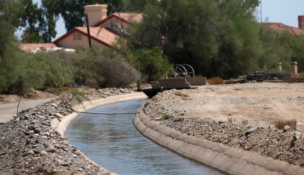Families Divided: Desolation, isolation make Border Patrol jobs more difficult
Arizona Capitol Reports Staff//April 11, 2008//[read_meter]
Families Divided: Desolation, isolation make Border Patrol jobs more difficult
Arizona Capitol Reports Staff//April 11, 2008//[read_meter]
PAPAGO FARMS — Just over the western horizon, 2 1/2 hours outside any major city, dust flies into the air.
Border Patrol agents are tracking ghosts. Until the agents see the migrants crossing here in person, they’re nothing but a spiral of dust or a footprint soaked up by soft sand.
It’s a difficult job, made more difficult by the desolation of the place and the isolation from families and loved ones.
Out here, there’s no Blockbuster, no after-work bar and, often, no family nearby.
Much is said about the immigrant families divided by the U.S.-Mexican border. But little attention is paid to the Border Patrol agents whose work keeps them divided from their families, often for long periods at a time.
For these women and men, separation is part of the job.
“It’s extremely difficult at first,” Border Patrol Agent Mike Scioli says. But “it’s pretty much the nature of the beast for this job.”
The test starts almost immediately when a Border Patrol agent is hired. Recruits are placed in a 12- to 16-week training program in Artesia, N.M. Families don’t follow them there.
“There’s so much to learn that’s it’s difficult to do that,” Scioli says. “You’re typically studying. You’re resting your body. Your legs take quite a torment from the five to six miles you’re running every day.”
Once they graduate, agents are sent to the Southwestern border, considered the most porous U.S. border, where most illegal immigrants cross into the United States. For many, this new place is far removed from their hometowns.
Scioli is one of about 3,000 agents who work the Tucson Sector for the Border Patrol. They are responsible for a stretch of the border that runs the 262 miles between the Yuma County line and Arizona-New Mexico state line. It’s one of the smallest pieces of the border, but it’s the busiest in the Southwest.
For the time being, Scioli is working media relations for the Border Patrol, but that’s a recent change. He came from the frontlines, enforcing drug busts and picking up border crossers. And, like many agents, Scioli doesn’t hail from a border state. His hometown is Buffalo, N.Y.
Public perception, he says, is that most agents have grown up in the Southwest, not far from the border they patrol. But in truth, agents hail from all over the country.
Sciloi, who is single, came to Arizona alone, but many agents bring families with them, renting apartments or houses in small towns along the border or further away in Tucson or even Phoenix, depending upon where they’re stationed.
Agent Christopher Knab works at the Tucson Sector Headquarters. He lives in southern Arizona with his wife, but he had to leave behind his extended family in Maryland. It has been about a year since he last visited family there, though he hopes to make it back some time this summer.
“Work,” he says, “generally dictates your schedule.”
Agent Alex Hernandez sometimes works as a “first responder” out of the Papago Farms camp southwest of Tucson, one of the small posts that dot the border. Agents are placed here, usually for a week at a time, “because that’s where we have a lot of heavy action,” Scioli says.
There’s not much to look at except acres of dead, yellow roughage. The border nearby that the agents protect is marked by little more than wire strung between wooden posts in some areas. It’s nothing like the rusted spine that divides Nogales, Mexico, and Nogales, Ariz.
This camp is a palace compared to most. It has recently been upgraded from the traditional metal boxes provided to agents in most other areas. There are bedrooms — two agents to each — a full kitchen, even cable TV. But it’s still very isolated.
Agent Alex Hernandez sometimes works here. Like the other agents at border camps, he’ll be here for a week and then he’ll head back to a larger facility where he is typiically stationed.
Hernandez has been a member of the Border Patrol for the past nine years. He’s been volunteering for these shifts for a long time, even though it means separating from his wife and four children in west Phoenix. Instead, he calls home three to four times a day.
“What makes it easy is here you can immerse yourself in your job,” Hernandez says. “I think what sticks out in your mind is when you come to camp and nothing happens.”
There are advantages to working the camps. Agents find the pace exciting; there is rarely any down time here “because that’s where we have a lot of heavy action,” Scioli says. And though they’re not paid any more for working on the border, they do make overtime.
Though Hernandez says his family has gotten used to his occasional absences, the separations can be hard, says Vanessa Crelia, one Border Patrol spouse. That’s why she has been working for nearly 10 years to create a support system for the spouses of agents deployed along the border.
Crelia’s husband joined the Border Patrol in 1998, and the couple had to relocate from Oklahoma to Arizona. To prepare for the move, Crelia went to an online forum and was able to make contact with another Border Patrol wife, who gave her help and advice before the couple even arrived in the state.
The effort touched Crelia, who decided she should return the favor. A year after her husband entered the Border Patrol, Crelia created BPSpouses.com, which stands for Border Patrol Spouses. Her Web site, which offers help locating schools, communities, friends and even shopping, has been going strong ever since.
About 50 volunteers help new recruits and spouses get adjusted through the site, which isn’t officially supported by the Border Patrol. Crelia says the site gets about 400,000 hits a year. She’s not sure how many people have been helped, but she knows the group is filling a need.
“If you moved from one state to another and you don’t know anybody there, you’re not going to have the same welcome,” Crelia says. “For some people, it’s more difficult than others … We give them comfort.”
Crelia is currently helping the Border Patrol create an official program that would give agents and their families information on adjusting through powerpoint presentations and manuals, she says. Spouses give up a lot — including careers of their own — for the Border Patrol and they deserve help adjusting, too.
As for the agents themselves, Scioli says the biggest help they get comes from each other.
“Your co-workers are your family,” he says. “That’s all you have. A lot of times, on and off work, these are the people you hang out with because your family is miles away.
“That’s the only way I could adjust.”
















